Pedagogical support of children with disabilities. Psychological support of parents in the conditions of inclusive education of children with disabilities
As part of the school week of psychology "Psychology in Education: Time Call" Competitive nomination "Psychology for all and everyone" Prepared and conducted an informational and educational event a teacher-psychologist MKOU Novochanskaya SOSH Barabinsky district Novosibirsk region Kotlyarov Alla Pavlovna "Maintenance of a family of a child with APV or disabilities in conditions educational organization” 2015
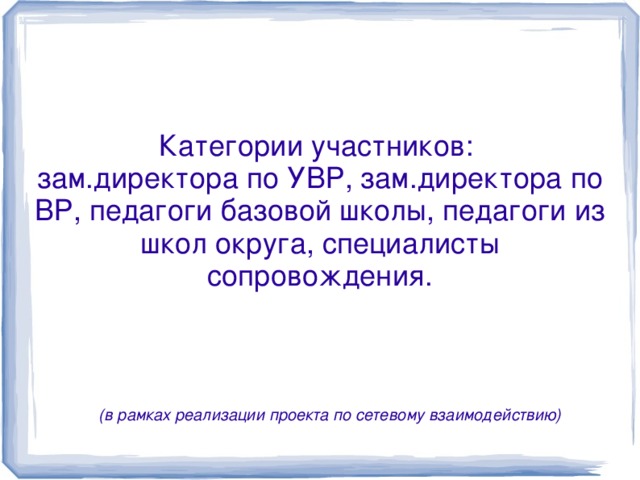
(as part of the project implementation on network interaction)
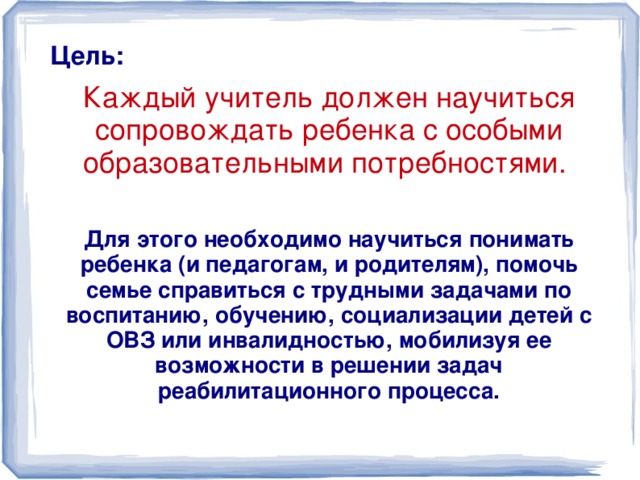
Purpose:
Each teacher must learn to accompany the child with special educational needs.
To do this, you need to learn to understand the child (and teachers, and parents), help the family to cope with the difficult tasks of education, training, the socialization of children with APV or disabilities, mobilizing its ability to solve the tasks of the rehabilitation process.
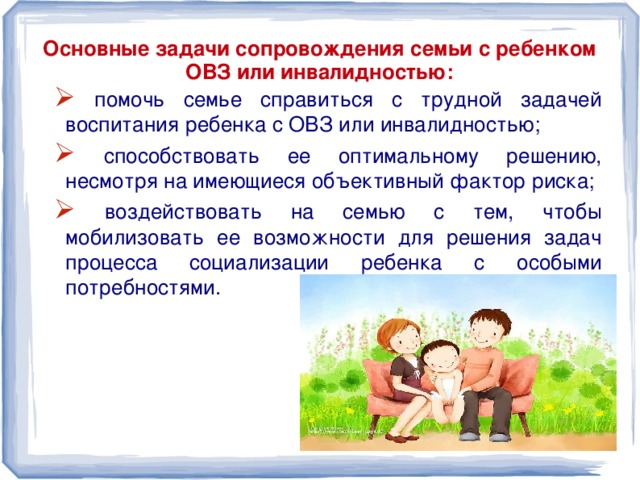
The main tasks of family support with child OVW or disabilities:
- help the family to cope with the difficult task of raising a child with ABS or disabilities;
- contribute to its optimal solution, despite the existing objective risk factor;
- influencing the family in order to mobilize its ability to solve the problems of the process of socializing a child with special needs.
Family functions
- birth and raising children;
- communication between generations, the preservation and transfer of families and family traditions;
- satisfaction of the need B. psychological Comfort and emotional support, warmth and love;
- creating conditions for the development of the identity of all family members;
- satisfying sexually erotic needs;
- satisfying the need for communication with loved ones;
- satisfaction of the individual need for paternity or motherhood, in contacts with children, their upbringing, self-realization in children;
- the health of family members, recreation organization, withdrawing stressful situations.
When a child appears in the family with ABS almost all the above functions are not implemented or not fully implemented. As a result of the birth of a child with deviations in development relations inside the family, as well as contacts with the surrounding society are distorted . Causes of violations are associated with psychological features special child, as well as with a colossal emotional burden, which members of his family are carried in connection with a long-acting stress. Many parents in the current situation are helpless. Their position can be described as internal (psychological) and external (social) deadlock .
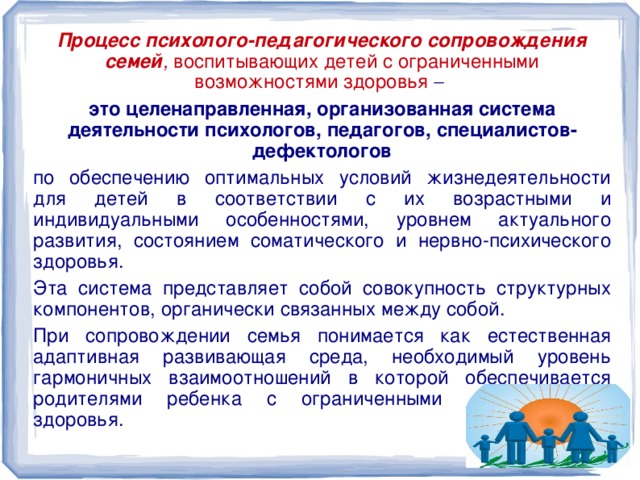
The process of psychological and pedagogical accompaniment of families , Railing children S. limited features Health
this is a targeted, organized system of activity of psychologists, teachers, defectol specialists
to ensure optimal livelihoods for children in accordance with their age and individual features, level actual development, the state of somatic and neuropsychic health.
This system is a combination of structural components organically interconnected.
When accompanied, the family is understood as a natural adaptive developing environment, the necessary level of harmonious relationship in which is provided by the child's parents with disabilities.
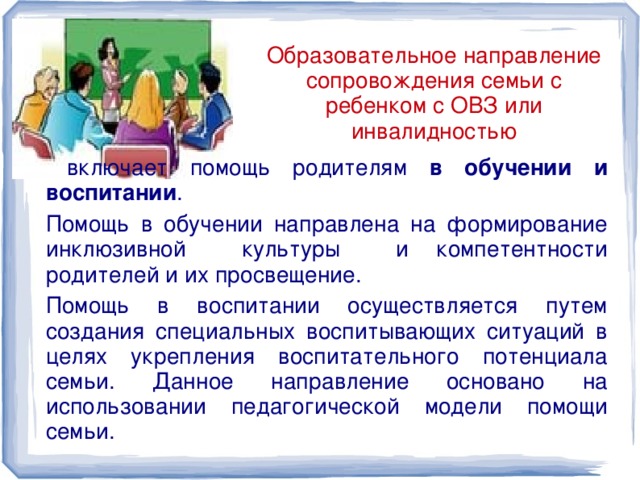
Educational direction Family accompaniment with a child with OVD or disability
in the help of parents in training and upbringing .
Help in training is aimed at the formation of the inclusive culture and competence of parents and their enlightenment.
Help in education is carried out by creating special raising situations in order to strengthen the educational potential of the family. This direction is based on the use of a pedagogical model of family assistance.
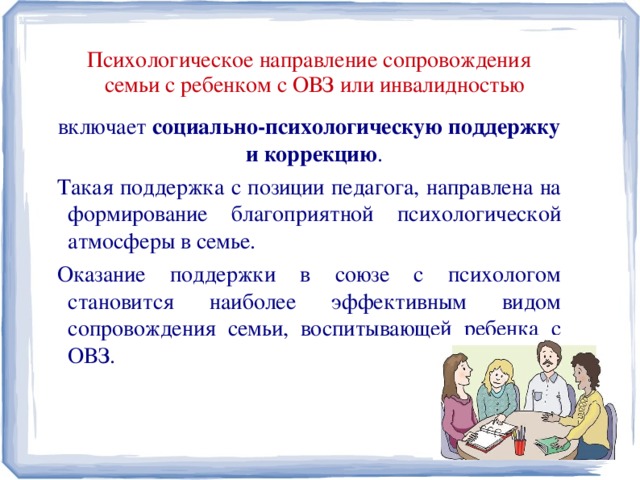
Psychological direction of escorting families with a child with APV or disabilities
includes socio-psychological support and correction .
Such support from the pedagog position is aimed at the formation of a favorable psychological atmosphere in the family.
Providing support in the Union with a psychologist becomes the most effective view Accompanying a family raising a child with ABS.
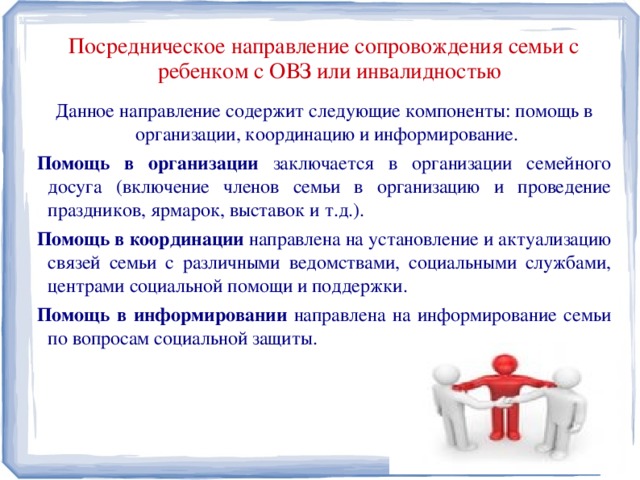
Intermediary direction of family support with a child with APP or disability
This direction contains the following components: assistance in organizing, coordination and informing.
Help in the organization lies in the organization family leisure (Inclusion of family members in organizing and holding holidays, fairs, exhibitions, etc.).
Help in coordination aims to establish and actualization of family relationships with various departments, social services, social assistance centers and support.
Assistance in informing aims to inform families on social protection issues.
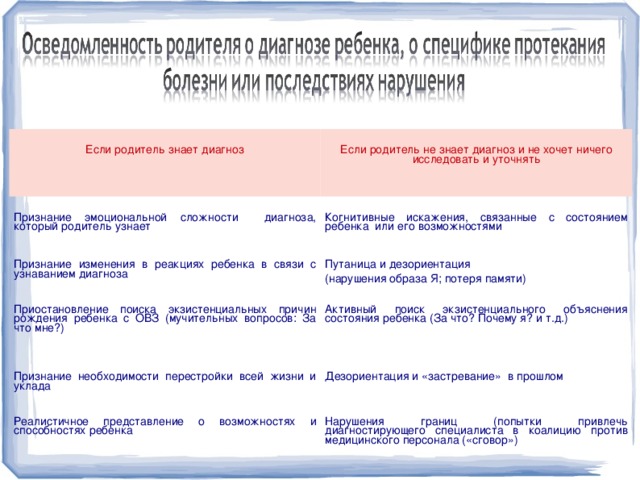
If the parent knows the diagnosis
If the parent knows the diagnosis and does not want to explore anything and check
Recognition of the emotional complexity of the diagnosis that the parent recognizes
Cognitive distortions related to the child's condition or its capabilities
Recognition of changes in the reactions of the child due to the recognition of the diagnosis
Confusion and disorientation
(Violations of the image I; memory loss)
Suspension of the search for the existential causes of the birth of a child with ABS (painful questions: for what I?)
Active search for existential explanation of the child's condition (for what? Why am I?, Etc.)
Recognition of the need to restructure throughout life and mistake
Disorientation and "jam" in the past
Realistic idea of \u200b\u200bthe possibilities and abilities of the child
Border Violations (attempts to attract a diagnostic specialist in a coalition against medical personnel ("Credit")
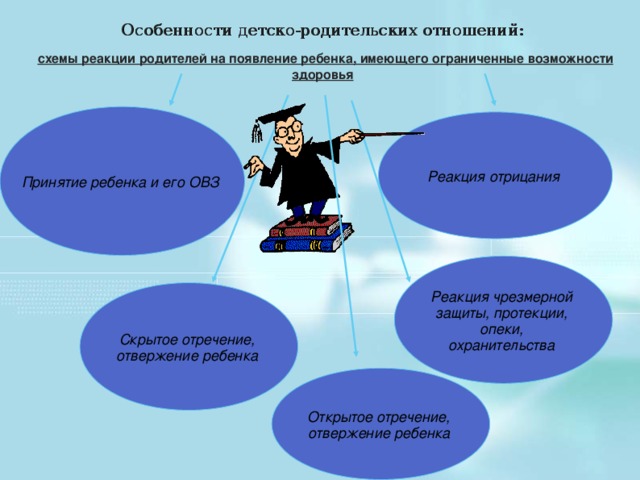
Features of child-parent relations:
parents Reaction Schemes for the emergence of a child having limited health opportunities
The adoption of the child and its OBS
Reaction of denial
Excessive reaction
protection, protection,
guardianship
guard
Hidden renunciation
child rejection
Open renunciation
child rejection
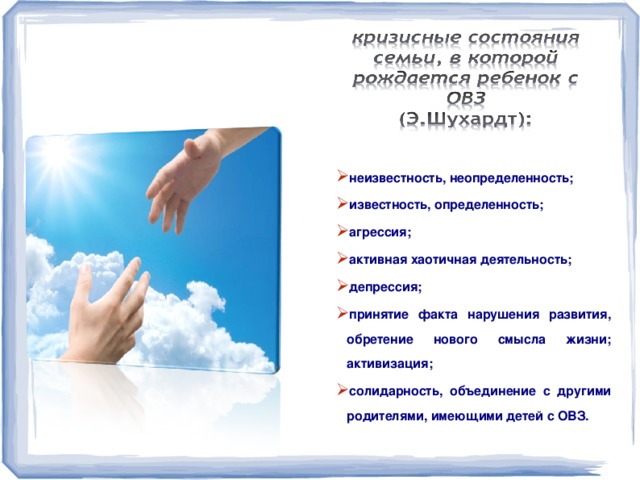
- unknown, uncertainty;
- fame, certainty;
- aggression;
- active chaotic activity;
- depression;
- the adoption of the fact of development, acquiring a new meaning of life; activation;
- solidarity, union with other parents who have children with ABS.
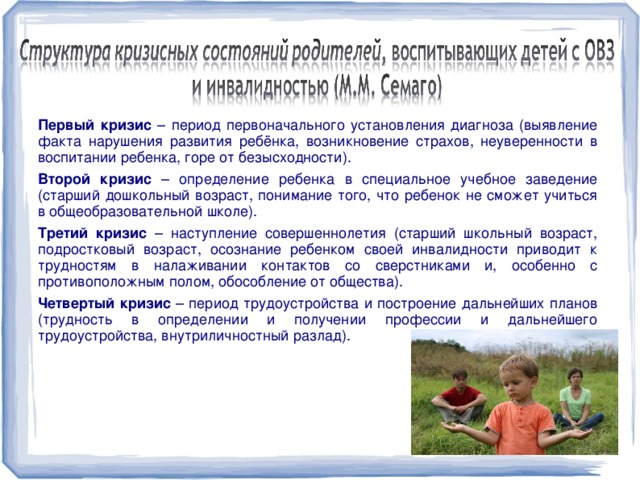
First crisis - The period of the initial diagnosis (identification of the fact of violation of the child's development, the emergence of fears, insecurity in the education of the child, the sorrow from hopelessness).
The second crisis - Definition of a child in a special educational institution (senior before school ageThe understanding of the fact that the child will not be able to study in a secondary school).
Third crisis - the onset of majority (senior school age, teenage yearsThe awareness of his disability to the child leads to difficulties in establishing contacts with peers and, especially with the opposite sex, isolation from society).
Fourth crisis - the period of employment and the construction of further plans (the difficulty in determining and receiving the profession and further employment, intrapersonal disorder).
1 . Parents every time worn mountain re-at every new stage of development, which the child passes.
2. Constantly graceful feeling of guilt, irritation, anger, a feeling of uncertainty and lack of stability.
3. Unknown and sometimes hopelessness, as the forecasts and the consequences of some violations and diagnoses are very ghostly.
4. Danging and suppressing negative feelings about the child.
5. Family and friends are reluctant to share with the parents of the child with OVS disappointment and sadness, and try to discuss with them only positive, optimistic moments, thereby leaving parents alone with their true feelings.
6. The medical community and specialists of helping professions may not show due attention and warmth, so necessary parentsand not reach the therapeutic alliance with parents.
7. Family and friends may turn away from their parents, or parents themselves can push out all the environments and stay in isolation.
But with all this, parents can eventually learn to love, appreciate, and be tied to their child. Parents together with children with ABS can build new, more realistic development prospects. Parental Adaptation In the situation of the stress of the child's birth with OVS, it is easier with the help of social, emotional, cognitive and behavioral processes, so they simply need specialized assistance and support.
1. The principle of subjectivity. In practical activity, this principle is reflected in following rules: First, you need to rely on the active position of the parents, their independence and initiative; Secondly, the specialist should not only form tolerance, but he himself possess it.
2. The principle of individualization. In practical activity, this principle is implemented in the following rules: first, the work carried out with the family should focus on the norms and values \u200b\u200bthat exist in this family; Secondly, choosing an educational agent, it is necessary to constantly monitor the effectiveness of one or another form of interaction with the family.
3. The principle of reflexive position assumes that the problems of the relationship of parents of students secondary schools And the parents of the child with OVD must be solved with them, and not for them.
4. The principle of creating a tolerant medium. It offers mutual responsibility and parents of schoolchildren, and parents of a child with ABS, as well as their mutual empathy, mutual assistance, the ability to overcome difficulties together. This principle is reflected in a number of rules for organizing practical activities: it is necessary to really respect the opinion of each parent; Each of the parents of children studying in the class must participate in activities. parent Committee and other forms of parental associations.
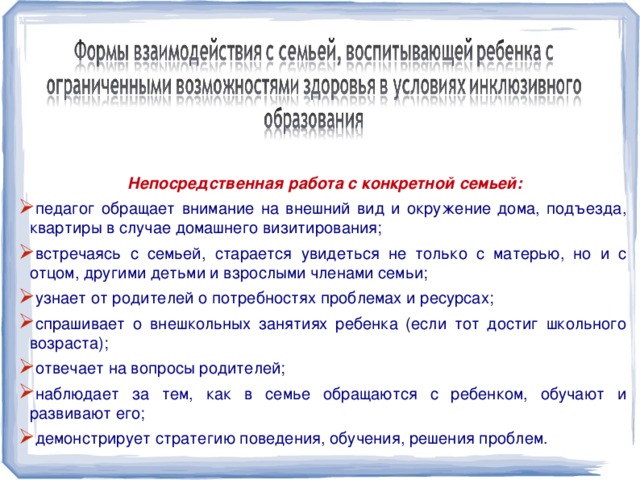
Direct work with a concrete family:
- the teacher draws attention to appearance and the environment of the house, entrance, apartments in case of home visiting;
- meeting with his family, tries to see not only with his mother, but also with the Father, other children and adult family members;
- learns from parents about the needs of problems and resources;
- asks about out-of-school children's classes (if he achieved school age);
- answers parents' questions;
- watching how in the family treat the child, they teach and develop it;
- demonstrates the strategy of behavior, learning, solving problems.
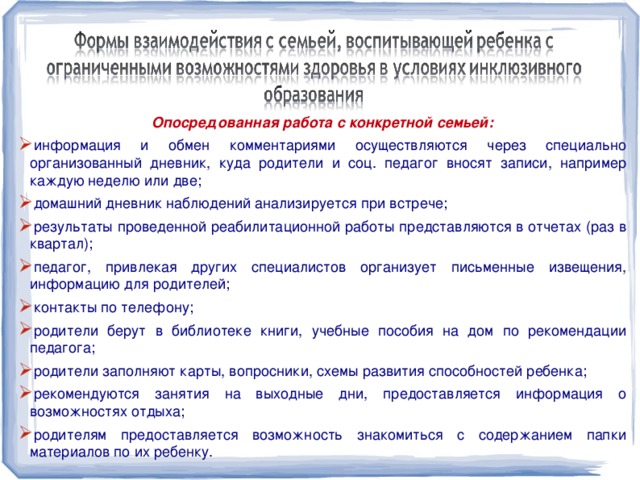
Indirect work with a concrete family:
- information and exchange comments are carried out through a specially organized diary, where parents and social. The teacher makes entries, for example every week or two;
- the home diary of the observation is analyzed at the meeting;
- the results of the rehabilitation work are submitted in the reports (once a quarter);
- pedagogue, attracting other specialists organizes written notices, information for parents;
- contacts by phone;
- parents take in the book library, tutorials to the house on the recommendation of the teacher;
- parents fill maps, questionnaires, child's ability schemes;
- weekend classes are recommended, information about resting opportunities is provided;
- parents are given the opportunity to get acquainted with the content of the materials folder for their child.
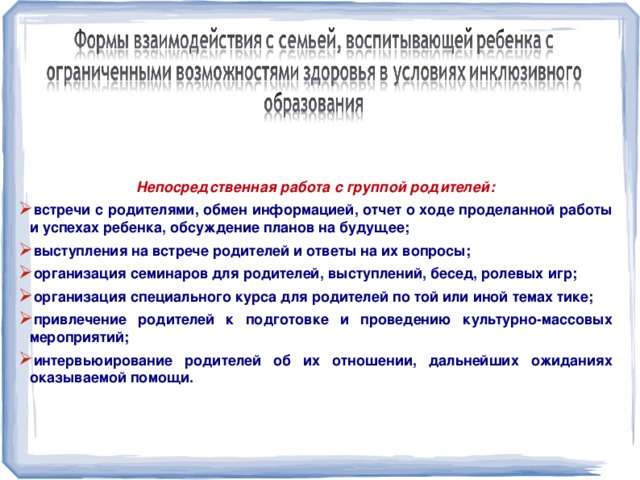
Direct work with parents group:
- meetings with parents, information sharing, report on the progress of the work done and the success of the child, discussion of plans for the future;
- performances at the meeting of parents and answers to their questions;
- organization of seminars for parents, speeches, conversations, role-playing games;
- organization of a special course for parents for one or another tick topics;
- attracting parents to the preparation and conduct of cultural events;
- interviewing parents about their attitude, further expectations of the assistance provided.
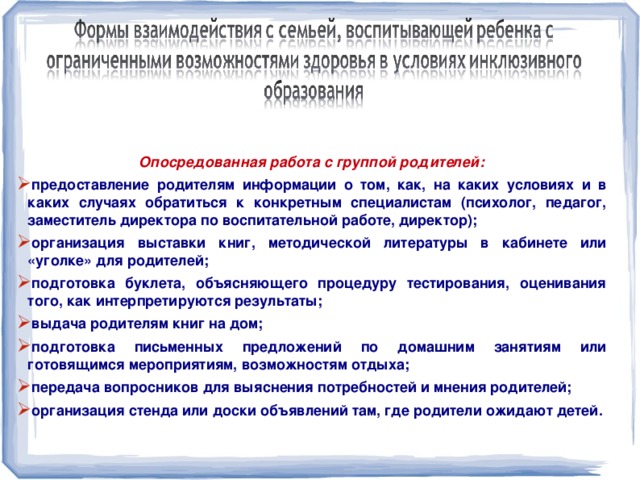
Indirect work with a group of parents:
- providing parents of information on how, under what conditions and in what cases to contact specific specialists (psychologist, teacher, deputy director for educational work, director);
- organization of books methodical literature in the office or "corner" for parents;
- preparation of a booklet explaining the test procedure, assessing how the results are interpreted;
- issuance to parents to the house;
- preparation of written proposals for home sessions or preparing events, resting opportunities;
- transfer of questionnaires to clarify the needs and opinions of parents;
- organization of the stand or bulletin board where parents expect children.
- Diagnostic model is based on the assumption of a shortage of special knowledge from parents who would allow them to take correct solution, and assumes assistance in the form of a diagnostic conclusion, which will serve as the basis for organizational decisions, including those who are in visiting other specialists.
- Pedagogical model based on the hypothesis of insufficient pedagogical competence of parents And he intends to assist them in raising children. At the same time, the face of the face, with respect to which is planned and impact, is the member of the family on which they complain.
- Social model assistance is based on the assumption that family difficulties are the result of adverse circumstances, and except analysis life situation And recommendations implies direct interference in these circumstances of customer life.
- Medical model Assistance suggests that the basis of family difficulties is the disease, painful states or painful development of the personality of one or both spouses, a child. Thus, the efforts of specialists are aimed at the cure of this disease, the rehabilitation of patients of family members, the adaptation of healthy family members to the peculiarities of patients.
- Psychological (psychotherapeutic) model assistance suggests that the reasons for certain problems or disadvantages in the family lie either in intimidian communication or in personal features family members. Psychological model assumes an analysis family situation Customer and his personality and creating a "diagnosis" based on it, which allows you to help the family and its members.
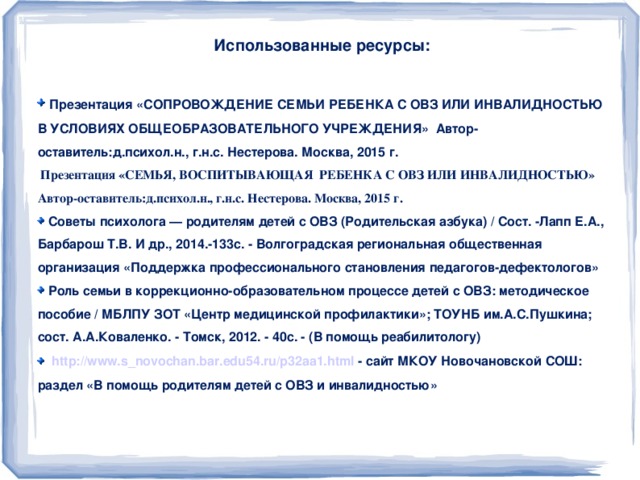
Used resources:
- Presentation "Maintenance of a family of a child with APP or disability in the context of a general education institution" Author-Leavor: D. Psychol.n., G.S. Nesterova. Moscow, 2015
Presentation "Family, raising a child with ABS or disability" Author-leftist: D. Psychol.n., G.N.S. Nesterova. Moscow, 2015
- Tips for a psychologist - parents of children with ABS (parent alphabet) / Sost. -Lapt E.A., Barbaros T.V. Et al., 2014.-133c. - Volgograd Regional social organization "Support for the professional formation of defectologists' teachers"
- The role of the family in the correctional educational process of children with OVD: toolkit / MBLPA ZOT "Center for Medical Prevention"; Townb named after A.S. Pushkin; Cost. A.A. Kovlenko. - Tomsk, 2012. - 40C. - (to help rehabitologist)
- http://www.s_novochan.bar.edu54.ru/p32aa1.html - website of MKOU Novochanskoye Sosh: section "To help parents of children with OVD and disabilities"
Anastasia Lavrentiev
Psychological and pedagogical support of a family raising a child with disabilities
At birth child with disabilities The root changes life families. Changes occur in psychological, social and domestic status families. First of all, the stressful situation affects the inner psychological climate of the family. All members are worried strong stress, as a result, uneven, sometimes and conflict relations. As practice shows, many families Do not come out of this situation, which leads spouses to mutual misunderstanding, sometimes to the divorce.
Family of a sick child Often isolates myself from society. Parents reduce communication with friends, with relatives, with neighbors, closes in themselves, in their grief.
Completely changing social and household lines families, his financial situation. One of the parents is forced to part with his work, devote himself to kid. Many parents characterize this situation as hopeless, see it the end of all their hopes, achievements, aspirations.
In this condition a family cannot really appreciate the situation and help your to kid. There is no characteristic joyful communication, emotional and biological communications between the child and parents. Communication of the child and parents, emotional and biological communication - this the necessary conditions For normal psychomotor The development of any child. Usually parents begin to look for help from experts. Following their recommendations begin to treat a child in good faith. Over time, without seeing significant changes in the development of the child, they do not feel satisfied, happy. Compare your life with the life of other families, and they begin to despair with peers, seeing that everything is sharply different.
A family, rising child with limited health opportunitiesnot only can not fully fulfill its social function, and itself becomes a real object in need of rehabilitation assistance. Modern approach to the rehabilitation and agility of children with restricted Health requires the inclusion of all family not only in"line of sight" complex medical psychological-Pedagogical correctional activities, but also in the rehabilitation process, the ultimate goal, which is the normalization of life itself families.
purpose psychological and pedagogical support of the family: Rehabilitation families, rising child with disabilitiesthrough the use of modern innovative methods and techniques psychological-Pedagogical work family.
Tasks: Promoting the formation of a favorable microclimate in familycontributing to the maximum disclosure of available family inland, creative and social resources.
Assistance to Personny I. social Development parents, children; Formation of skills of social activity and constructiveness.
Assistance to the formation of adequate perception by parents of their child with disabilities through the increase in psychological-Pedagogical competence of parents;
Assistance to the formation of active life position families.
Process psychological and pedagogical escort 3 interacting and interrelated directions:
1. Consultative and diagnostic direction. At this stage, collecting information about members families, kid; Determination of the nature of the internal and external relationships families. Methods: Interview, Iqualiation, Testing, Consulting, etc.
2. Correctional and developing direction. The work of this stage is based on the database of the Consultative and Diagnostic Block. At this stage, an individual and low-group correctional development work is carried out with familynormalization psychological, social status families. Methods: Customized, Group Correctional and Educational Classes psychologist, educator, deuterine; Consultations of specialists from different areas; Educational seminars for parents "School of Parents".
Consultative diagnostic block - the basis of the rehabilitation process.
Primary learning of families raising Children S. cerebral palsy, is carried out on the questionnaire, which is compiled on the basis of a similar survey described in the book "Complex rehabilitation of children with cerebral paralysis" whose purpose is the identification of social status families, material well-being, willingness to cooperate with a rehabilitation institution. Criteria social characteristics families chosen family composition, socio- psychological well-being of families, changes in familywho occurred with the birth of a child, the mother's labor device, the father's labor device, the chatting of the child with peers. Criteria of material well-being families are cash income, living conditions, separate room for a child. Readiness for cooperation with the rehabilitation institution find out in the following points: Lie there is necessary equipment For the development of a child, whether classes with a child are held at home, is satisfied with a family Quality of rehabilitation assistance.
Families Classified as follows way: The first group is made up familieswho need help from a rehabilitation institution in teaching the methodology of correct classes with a child.
The second group is made familieswho need psychological-Pedagogical care. it family welfarewho are broken with the birth of a sick child. This includes families, one of whose parents has no capabilities Work due to child care. Many of these families are broken by society. Parents are hard to experience the crisis. As a rule, not able to exit the situation themselves, need not only a rehabilitation institution, but by the state.
The third group is made familieswho extremely need psychological-Pedagogical care. This includes incomplete families, familiesfrom which father gone family Alcoholikov, drug addicts. Parent, rising child, not opportunities to keep family material. A family Lives in extreme poverty. Such families Extremely need from the state in permanent help and support.
After the initial separation of families in groups, there are an in-depth study of families 2 and 3 groups. Diagnostics, including psychological Study of the features of the members of the members familiesInside family relationships, relationship families with society is carried out psychologist using the following tools:
1. Individual conversations In order to identify intra-family relationships, social characteristics families.
2. Picturesque test "Kinetic Figure families» R. Berns and S. Kaufman (Definition of a subjective family situation).
3. Questionnaire ASV (family analysis education) R. V. Ovcharov.
4. Test - Questionnaire parental relationship To children. Authors A. Ya. Varga, V. V. Stolin.
5. Test T. LIRI.
6. Personal questionnaire G. Aizenka.
2. Correctional and developing direction - is an organized, focused, individually oriented process. For each families, given its features, selected individual route rehabilitation. Psychological and pedagogical support of the family, expands the subject of correctional development impact: instead of one (child with disabilities) There is a polymodal subject (-baby mother-dad- and others.) . At this stage, the provision of special psychological-Pedagogical care to overcome various kinds of problems associated with raising a child, correction of inadequate behavioral and emotional states Parents, work is carried out on harmonization inside and outwardly - family relationships. Are used modern methods psychocorection work: FairyThe Articles, Training Classes, psychogympics and others.
To work this area Educational and educational work of specialists who are implemented in the form "Schools for parents for the preparation of children of social and consumer adaptation". In our approach, this direction does not carry the main load, but performs a very important preparatory function. Systematically according to the plan for parents, specialists are held round tables, conversations, lectures, seminars on different topics. Booklets, stands, abstracts are preparing. Parents can get answers to specific questions, tips, recommendations. In general, this work increases the competence of parents.
3. Socio-cultural measures aimed at rehabilitation familiesare a special form of interaction between participants who contribute to the deepening of understanding and changing some of the life ideas of families. Parents and children are given opportunity Reveal your talents, increase creative and cultural potential families, expand and restore educational potential of the family.
Second stage - Group exit to the socio-cultural environment of the city (library, center of culture, theater, cinema, cafe, etc.) Helps to activate seven, overcome existing "Social barrier". At this stage are held various events socio-training, legal, integration destination.
Third Stage - holding an annual final event for socio-cultural rehabilitation families, in which a competition is held among families, educating children with disabilities"My a family» , Family Creativity Exhibition.
Literature
1. Complex rehabilitation of children with cerebral palsy: Method. Recomment. - M., 1998. - 534 p.
Klinko Svetlana Evgenievna
Position: Psychologist teacher
Educational Institution: MBOU "Top-Obskaya high school named after M.S. Evdokimova "
Settlement: Altai Territory, Smolensk District, P. Top-Ossan
Name of Material: Article
Subject: "Psychological and pedagogical support of a family having a child with OVD"
Publication date: 02.26.2016
Text part of the publication
Psychological-pedagogical
accompanying a family raising
child with ABS in the conditions of introducing GEF
.
Svetlana Evgenievna Klinkko psychologist-teacher MBOU "Up-Okskaya Secondary School named after MS Evdokimova" Traditionally, the family is perceived as a natural medium providing harmonious development and social adaptation of the child. A special situation in this issue is occupied by families raising children with disabilities (hereinafter referred to as ABS), which is characterized by a high level of "problematic". Work with a family raising a child with ABS is due to the main directions of state social Policy to improve the situation of children in Russian Federation, the purpose of which is to ensure the socialization of children in particularly difficult circumstances, their full rehabilitation, including medical, psychological and social, for successful integration into society. Concept family education The child with deviations in development allocates the basic idea of \u200b\u200bworking with the family - achieving the harmonious life of a family with a non-standard child, the maximum development of the potential features of the child and each family member and their successful integration into society. Therefore, parents need a timely psychological and pedagogical assistance in the upbringing of this category of children and their further support to overcome their alienation in society and the development of mutual assistance. Family is a special world. Birth in the family of a child with ABS - These include children who have physical and (or) mental disadvantages that impede development educational standards Without creating special conditions for obtaining education) - it is always deep 1
Experiences for all members of his family. Awareness and taking themselves as a child's parents with ABS is the main and most severe problem of such families. Especially during this period, parents need support for specialists who believe in the ability to help a child with any violations familiar with the practice of socio-psychological support of the family and methods of upbringing. That is why special activities on psychological and pedagogical support of such families are in demand and relevant. The maintenance service in the education system has become an integral part of Education systems providing comprehensive multidisciplinary medical and psychological and pedagogical and social help in the upbringing, training and development of students. In the organization of accompaniment services, all the necessary conditions professional activity form on the basis of psychological and medical and pedagogical commissions (PMPC). Psychological and pedagogical support of a family having a child with APV is an activity aimed at topicalization of family correctional resources that ensure the effectiveness of its functioning, especially during periods of crises related to the upbringing and development of a child with ABS, which allows you to create an appropriate child a child corrective space , form and implement adequate needs of the child's education strategy based on constructive parental Installations and positions in relation to it. It should be noted that in lately The term "accompaniment" is often used in different situations and in relation to various tasks. What does this mean the concept of "accompany"? In the "Russian Dictionary" (edited by D. Ushakov), we read: accompany - it means to be done at the same time with something, to accompany anything, to follow with someone, being near, leading somewhere or walking for -Theless. In the "new intello- 2
The word-forming dictionary of the Russian language "(by T. F. Efremova) Support is understood as: a process accompanying any phenomenon, action. The process of psychological and pedagogical support of families raising children with ABS is a targeted, organized system of psychologists, teachers, social teachers, defectologists to ensure optimal conditions of life for children in accordance with their age and individual characteristics, the level of actual development, the state of somatic and nervously - Mental health. This system is a combination of structural components organically interconnected. The following types of psychological and pedagogical assistance can be distinguished by a family raising a child with ABS: - Informing: Specialists of the PMPC can provide family or its individual members about the laws and features of the child's development, about its capabilities and resources, about the essence of the disorder itself, which is suffering their child , on issues of education and training of such a child, etc.; -Individual consulting: assistance to parents of children with ABS, the essence of which is to find solutions of problem situations of psychological, educational -podagogical, medical and social, etc. character. Considering consulting as aid to parents in establishing constructive relations with their child, as well as the process of informing parents on the regulatory and legal aspects of the future family, pulling them out of the "informational vacuum", predicting the possibilities of the child's development and education, you can allocate several consulting models, the most adequate Of which is a tripartite model, which envisages the situation when, during the consultation of parents, experts should evaluate and take into account the nature of the problems and its level. 3.
The attitude towards children of the most severe category of children with comprehensive disorders has changed. With the development of special pedagogy and psychology, the problem of complex violations attracts more close attention of domestic and foreign researchers. Over the past year, a number published regulatory documentsgoverning the organization of the content of correctional and pedagogical work with this category. The results of numerous studies indicate that the system for providing correctional assistance to children with multiple deviations does not provide proper development. The comparative analysis of the data obtained has shown that due to the complexity of the structure of the violation, the children of this category cannot study on special correctional programs that correspond to a leading defect. Teachers and psychologists pass a long way before deciding how to work with a child, as there is a shortage of developments for their survey and training. There is a clear deficiency of awareness of all specialists about the existing modern teaching technologies and education of children of the specified category. The problem of rendering a real timely help Children with complex violations in development are exacerbated by the fact that some one-sidedness is observed in the work by the teacher and psychologist. The work of a psychologist in special institutions is currently reduced mainly to diagnostic activities, as undoubtedly very an important stage In working with any child with deviations in development. The high figure in the work of teachers in relation to occupations is likely to indicate that children are engaged in the total composition of the group, but the results of teaching children with complex disorders are very low. Accordingly, such children need an individual approach and determining paths correctional work According to their capabilities. four
Very important relationships of the family members of the child with violations in development with society are very important. Family, together with all relatives, long and near, is a microsocium, with its unique microclimate, established relationships. And if among several generations (as a rule, two to three) sick child appears for the first time, it is subjected to a serious tensile test. After all, no member has the experience of interaction with such a child. Immediately arises the mass of questions close to the state of panic: "How so?", "For what?", "Why do we have?", "What to do now?", "What do doctors contact?", "Who will take the main cargo concerns about the child? ". If the whole family can constructively approach the solution of these and many other issues, it is likely that many difficulties can be avoided, and perhaps to defeat the disease. In addition to generating right relationship To the sick child, the parents and compliance with the above requirements are of great importance, the formation of adequate self-esteem in children, the right attitude towards the defect and the development of volitional qualities in their lives. Thus, a family in which there is a child with OVD is a special object of attention of all specialists who assist the family. Optimal organized conditions Life in the family will create a sick child background for its successful development, learning and further social adaptation. When carrying out psychocorrection activities, the family is understood as a natural adaptive developing environment, the necessary level of harmonious relationship, which is provided by the child's parents with psychophysical disorders (or those who replace them). Provision psychological assistance Families makes it possible through the neutralization of personal problems of parents arising from their emotional experiences related to child impairment, optimize its development and integration into society. The main goal in psychocorrection work with parents is the formation of positive parents
View on a child who has a violation of development. The adequacy of the position of the parent allows him to gain a new life point, harmonize self-consciousness and relationship with the child, to increase its own self-esteem. This, in turn, ensures the use of harmonious models of education and in the future the optimal version of the social adaptation of the child. A precipitated psychological impact changes qualitatively to the role of parents. They are actively involved in a psychocorrection and simultaneous educational process of their own child. This process has a positive impact on the formation of adequate parent-child contacts. Children with disabilities are often children who are not able to visit themselves educational establishments. The school can provide realizing the rights of such children on the psychological and pedagogical support of their families through the introduction of information and communicative technologies. Distance Education - Training Technology at a distance in which the teacher and trainees are physically located in various places and contact through the Internet. In the way, psychological and pedagogical support can also be organized using ON-Line technologies. The child and his family appears the opportunity to successfully implement a program with the help of traditional forms of psychological and pedagogical support (group, individual classes, consultations) and non-traditional - in the form of ON-Line. Support in the form of ON-LINE is carried out using the same traditional forms and methods, but remotely. Internet confidence service allows psychological support to parents on learning, development, child education in remote mode. In particular, we are talking about consulting with the help of Internet technologies in real time. This will allow parents of a special child promptly together with a psychologist to seek the answer to the current difficult situation or non-standard moment. The feedback service provides an opportunity to deliberately 6
To inform parents about those actions that lead to the achievement of the goal. With the help of Internet technologies, the functions may be the following: support and promoting leading to success and giving the desired result of the participants educational process; Modeling ineffective behavior by learning, extracting experience from past errors and failures. However, there are also their difficulties. For example, the network counseling process is more difficult than full-time, since we can not always see the non-verbal manifestations of a person, his reaction, which makes it difficult to get full information. In addition, network counseling without video communications requires a specialist of the ability to accurately formulate questions, select words in order for all interpretations to be safe, are unequivocal, specific and accessible. The process of children's and adult counseling compared to individual is even more difficult and less predictable, because it requires a more thorough attitude to the words, the availability of signs of solving conflict situations. In 2016, the project "Safe House" was launched, the purpose of which is to increase the competence of schoolchildren with HSA and their parents in the field of life safety fundamentals (hereinafter referred to). During the implementation of the project, parents were granted memo, practical advice on organizing at home and in the courtyard of a safe environment for a child. Currently, the project "Baby" on the introduction of schoolchildren with APV to reading is being implemented. In addition to project activitiesIn groups with children with ABS, traditional events with parents are held: consultations, meetings. Consultations are planned and at the request of customers. Along with oral and written consultations, parents of video consultation are offered, a series of "Nanny hurry to help", extraordinary methods of upbringing Dr. Harvey Carp, developing discs for children. Parents themselves share useful information. Parental meetings 7.
are held in the form of workshops, round tablesare necessarily illustrated by slide presentations, which contributes to better learning and memorizing material. Gaming forms are widely used, special exercises for group cohesion. Thus, targeted psychological and pedagogical impact qualitatively changes the role of parents. They are actively involved in a psychocorrection and simultaneous educational process of their own child. This process has a positive impact on the formation of adequate parent-child contacts and contributes to the socialization of children with HSA.
About the author:
Svetlana Evgenievna Klinko, teacher-psychologist MBOU "Verkh-Obskaya School named after MS Evdokimova "Address: 659616 Altai Krai Smolensky district with. Katunskaya st. Maltseva 6 Phone: 89039951134, E-mail: [Email Protected]
Bibliography:
1. Bolsunskaya, N.A. Network psychological support of families / N.A. Bolzunovskaya. - Access Mode: wiki.iotindex.php 2. Forbris, S.D. Your child is studying at auxiliary school / S.D. Forbris. - M., 1993. 3. IPPOLOLITOV, M.V. Education of children with cerebral paralysis in the family: Book for parents / M.V. Ippolitov. - M., 1993. 4. Karpenkova, I.V. Psychological aspects social rehabilitation parents who have children with problems in development / I.V. Karpenkova // Forecker. - 2001. - №2. 5. Losina, O.A. Remote education as one of the forms of organization of a barrier-free environment for children with disabilities / O.A. Losina // Pedagogical Review: Scientific and Methodical Journal. - 2010. - № 1. - S.73-75. 6. Methodical recommendations for experts of distance education centers in the subjects of the Russian Federation "Features of the organization of training for children with disabilities for remote technologies" in order to support the implementation of the event "Development of remote education of children with disabilities". - M.: Moscow Institute of Open Education, 2010. 7. Solodyankina, O.V. Education of the child with disabilities in the family / O.V. Solodunkin. - M.: Arcta, 2007 (Correctional Pedagogy). eight
